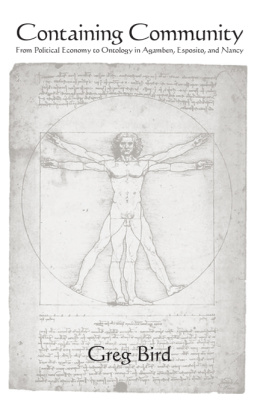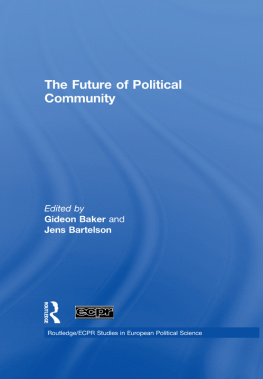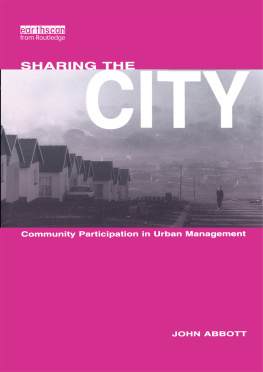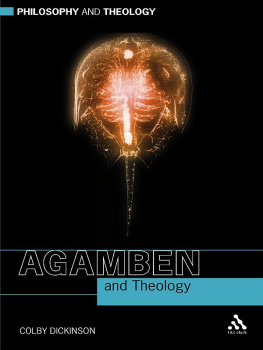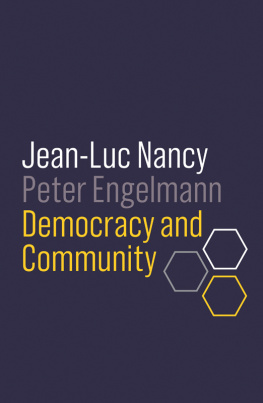Containing Community
SUNY series in Contemporary Italian Philosophy
Silvia Benso and Brian Schroeder, editors
Containing Community
From Political Economy to Ontology
in Agamben, Esposito, and Nancy
Greg Bird
Published by State University of New York Press, Albany
2016 State University of New York
All rights reserved
Printed in the United States of America
No part of this book may be used or reproduced in any manner whatsoever without written permission. No part of this book may be stored in a retrieval system or transmitted in any form or by any means including electronic, electrostatic, magnetic tape, mechanical, photocopying, recording, or otherwise without the prior permission in writing of the publisher.
For information, contact State University of New York Press, Albany, NY
www.sunypress.edu
Production, Ryan Morris
Marketing, Fran Keneston
Library of Congress Cataloging-in-Publication Data
Names: Bird, Greg, 1978- author.
Title: Containing community : from political economy to ontology in Agamben, Esposito, and Nancy / Greg Bird.
Description: Albany : State University of New York Press, 2016. | Series: SUNY series in contemporary Italian philosophy | Includes bibliographical references and index. | Description based on print version record and CIP data provided by publisher; resource not viewed.
Identifiers: LCCN 2016030427 (print) | LCCN 2015042620 (ebook) ISBN 9781438461854 (hardcover : alk. paper) ISBN 9781438461878 (e-book)
Subjects: LCSH: CommunitiesPhilosophy. | Agamben, Giorgio, 1942 comunite viene. | Esposito, Roberto, 1950- Communitas. | Nancy, Jean-Luc. tre singulier pluriel.
Classification: LCC B105.C46 (print) | LCC B105.C46 B57 2016 (ebook) | DDC 320.01/1dc23
LC record available at https://lccn.loc.gov/2016030427
10 9 8 7 6 5 4 3 2 1
To Kevin my love
Contents
Acknowledgments
Sections of chapters 1 and 5 appeared in my essay, Roberto Espositos Deontological Communal Contract, and parts of chapter 5 appeared in Community, Immunity, and the Proper: An Introduction to the Political Theory of Roberto Esposito which I co-wrote with Jon Short. Both were published in Angelaki: Journal of the Theoretical Humanities (18.3). I am a grateful to Jon for allowing me to use our co-written material in this chapter.
I must begin by thanking Roberto Esposito for not only inviting me to spend two summers in Napoli and Pisa, but for his mentorship and for introducing me to the Italian Theory circle. I am grateful for all the conferences, seminars, and dinners I have had with many friends in this circle, including Stefania Achella, Daniela Calabr, Diego Ferrante, Dario Gentili, Dario Giugliano, Enrica Lisciani Petrini, Valentina Mascia, Marco Spina, Elettra Stimilli, Davide Tarrizo, and Marco Spina. Thank you to the staff at SUM in Napoli, Antimo Chiariello, Federica Dura, Giovanne Ideale, and Ivana Orefice, for making me feel at home and for being patient with my Italian. Although I still cant say that agg parlat tropp napulitan , I now feel as if I have found una casa lontano da casa .
Back in Toronto, I owe many thanks. To Brian Singer, Kathy Bischoping, Anne OByrne, Philip Walsh, and Lorna Weir; without your intellectual and personal mentorship, this book would never have been written. My department and Wilfrid Laurier University, provided me with the time and means to complete this book. To my close peers, Jon Short, Kristin Hole, James Overboe, Mihnea Panu, Raluca Parvu, and Kristin Shaw, thank you for helping me work through the process of writing and many of the ideas presented in this work. To my many friends in Toronto, thank you for being who you are. To my mother Kathryn Wells, David, Alison and Tony, in-laws Candice and Bob and the rest of the Hegges, and, of course, Kevin, thank you for your love, support, and patience. Finally, thank you to my acquisitions editor, Andrew Kenyon, for your timely responses, encouragement, and patience; to the blind reviewers for your thoughtful feedback; to my copy editor Daniel Otis; to my editorial assistant Jessica Kirschner; to my senior production editor Ryan Morris; and to everyone else who has contributed to printing this book at SUNY Press. Although this book is attributed to a single author, it is not the work of single person.
Introduction
The focus of this book is three key texts that were products of the turn-of-the-century debate about community in continental philosophy: Giorgio Agambens Coming Community , Roberto Espositos Communitas , and Jean-Luc Nancys Being Singular Plural. What follows is not an introductory text that provides a comprehensive, synthetic, and categorical summary of this debate. I engage in a politically grounded philosophical elaboration of how the exigency of community has been addressed by each philosopher. I aim to underline and draw attention to the critical insights each makes in regard to the prospect of rethinking community in our globalized world.
The first wave of this debate took place in France. In his original essay The Inoperative Community, Nancy explicitly formulated community in Heideggerian terms, with a Bataillian inflection, around the problem of death and finitude. Blanchots Lvinasian rejoinder, with an alternative Bataillian inflection, in The Unavowable Community helped Nancy to revamp his original statements. The final result was a redrafted publication as The Inoperative Community . In this work, Nancy drew a line between negative formulations of community based on the Other and his Heidegger-inspired notion of a plural ontology grounded in the existential analytic of being-with. Nancy is quite clear about these distinctions in his introduction to the Italian edition of Blanchots book, later published as La communaut affronte , and in his extensive reflections on Blanchot in his recently published La communaut dsavoue .
The texts produced by Nancy and Blanchot in the 1980s revived, emboldened, and updated Batailles project of overhauling how community had traditionally been understood in the West. But these texts are only of secondary concern for this book. My main interest is the three subsequent texts that were written in the 1990s. They represent a second wave of this debate. Each expands and further develops the terms laid out by the earlier debate. They helped to elevate the problem of the commons to a position of prominence not only in the rethinking-communism discussion, but also within continental philosophy itself.
The Coming Community , Communitas , and Being Singular Plural play a monumental role in their authors larger body of work. These three texts also helped elevate each author to prominent positions in philosophy both on the continent and abroad. They have become, with Esposito arriving on the scene a little later, core references for those interested in a whole series of questions and problematics they address. Surprisingly, very little has been written in English that considers them as a group of thinkers. Although this debate took place in the 1990s, many of the insights made in these texts are directly relevant for contemporary social and political theory. Not only has each philosopher carried the ideas he develops in his text on community forward in his subsequent writings, but many of the insights he makes in these texts are critical for those who remain skeptical of, yet committed to, to the exigency of communityespecially those of us who continue to identify as unorthodox communists.

